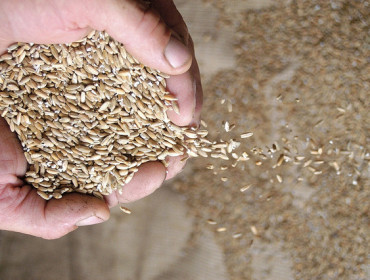
The Abundant Life
Lectionary Reflection for the 24th Sunday after Pentecost, Year B`
November 8, 2015
Then he called his disciples and said to them, “Truly I tell you, this poor widow has put in more than all those who are contributing to the treasury. For all of them have contributed out of their abundance; but she out of her poverty has put in everything she had, all she had to live on.” Mark 12:43-44
This week’s readings bring us glimpses of two widows: two women on the margins who nonetheless manage to see abundance rather than scarcity. To first century audiences, their situations would have appeared hopeless. Their choices would have seemed absurd—give away all your money or share your last bit of food with a stranger. I wonder how congregants hear these stories today.
Might the 1 Kings story of the widow of Zarephath read more like a fairy tale than a story of God’s provision? Does the widow at the temple in Mark’s gospel come off as foolish for donating her pittance, for casting away her paltry security? Do we tend to neutralize and rationalize these  stories? Will we simply dismiss them as not relevant because no one in his or her right mind would take such foolish risks? For those of us who don’t have to worry about shelter, or our next meal, or at least some semblance of security for our old age, I suppose it’s not much of a stretch to hear these two accounts as nice Bible stories that don’t really apply to us.
stories? Will we simply dismiss them as not relevant because no one in his or her right mind would take such foolish risks? For those of us who don’t have to worry about shelter, or our next meal, or at least some semblance of security for our old age, I suppose it’s not much of a stretch to hear these two accounts as nice Bible stories that don’t really apply to us.
Could we be missing the crucial point by focusing on the “all or nothing†polarity that pervades the narratives? Our culture certainly preaches a gospel of scarcity wherein each person must accumulate as much as possible and store away treasure on earth, lest there be nothing more. In North America, we live in such a land of plenty—albeit unevenly distributed—that it is tough to imagine not having choice, not having access to at least some trappings of “the good life.†Perhaps this cultural lens actually blinds us to the possibilities of abundance, including the ones present in this week’s Old Testament and Gospel lessons.
Some of the happiest most fulfilled people on the face of this planet have the fewest resources and choice. These same people are also some of the most generous. They don’t seem convinced that hoarding their meager resources is the best use of them, and they appear to find more joy and possibility in sharing with others and in building relationship capital. For many of them, time is the precious commodity, because without distractions of myriad entertainment and material options, the simple rhythms of daily life seem downright sacramental. Don’t get me wrong; I’m not trying to present a pastoral or nostalgic picture of poverty. This reality is something I have observed—both in my own family or origin and among my sisters and brothers in Christ in countries south of the equator.
My own mother recalls not having very much in the way of material goods while growing up on a Kentucky foothills farm during the Great  Depression. But she adds, “We always had plenty of food. We had love. And we had fun.†She also remembers her family sharing a meal with anyone passing through the area and her parents quietly helping others in greater need.
Depression. But she adds, “We always had plenty of food. We had love. And we had fun.†She also remembers her family sharing a meal with anyone passing through the area and her parents quietly helping others in greater need.
In some African nations, need drives their concept of money. The person who has the greatest and most immediate need usually gets the resources available in the community. Someone who has money set aside for school tuition will sacrifice it to someone who needs immediate medical care, for example. By meeting the immediate need, those who help trust that their needs will also be met by community members. Even in the midst of poverty, there is a sense of shared abundance and the hopeful trust that there is enough to go around.
This approach to faithful living and giving makes the widow’s mite mighty and the empty plate impossible. Collectively, we have enough dear friends. We have only to trust in God, let go of fear, and be free to live life in divine abundance and hope. Sounds easy, doesn’t it? The big question, the elephant in the room if you will, is why then do we try to make it so difficult?
Blessings on your faithful, fruitful, and fearless preaching and teaching!
(Photos:olearys, zeevveez, and Egan Snow, Creative Commons. Thanks!)
Stewardship of Life
Thank you for printing this article!
You can view this article online at http://bit.ly/1Nf85Xb.
© 2015 Stewardship of Life Institute
https://westrevision.stewardshipoflife.org



